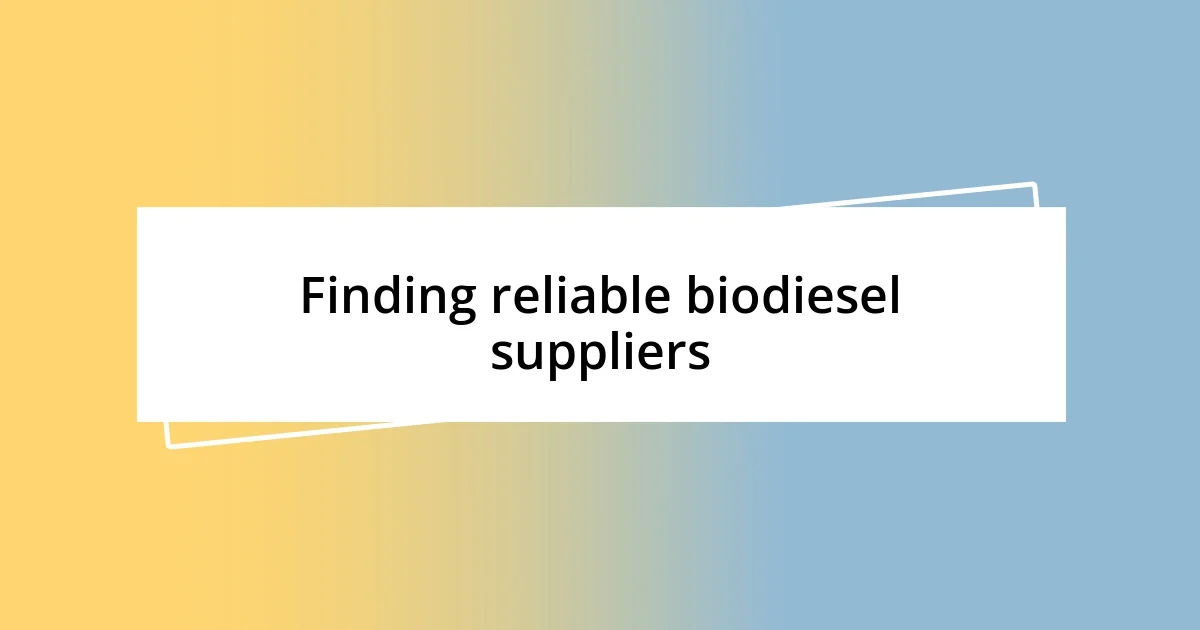Key takeaways:
- Biodiesel is a renewable fuel from natural sources that reduces emissions, supports local economies, and provides better engine lubrication.
- Selecting high-quality biodiesel involves considering the source, blend percentage, supplier reputation, and local availability to ensure optimal performance and sustainability.
- Regular maintenance, monitoring fuel performance, and understanding the costs associated with biodiesel are crucial for maximizing the benefits and efficiency of a biodiesel-powered vehicle.

Understanding biodiesel basics
Biodiesel is a renewable fuel derived from natural sources like vegetable oils and animal fats. I remember the first time I learned about it; I was fascinated by how something that seemed like kitchen waste could power a vehicle. It makes you wonder, doesn’t it? What if we could harness more of our waste products for something so useful?
One of the key aspects of biodiesel is that it’s often blended with traditional diesel, creating a mix that can be used in many standard engines. I’ve personally experimented with different blends in my vehicle, and it’s incredible how a simple change in fuel can lead to a more sustainable driving experience. It gets you thinking about our everyday choices — are we really considering the impact of what we put into our engines?
Understanding biodiesel also involves recognizing its environmental benefits. It generates less pollution compared to fossil fuels and helps reduce our carbon footprint. Reflecting on the changes I’ve made in my own life, I feel a sense of responsibility and pride knowing that my choice to use biodiesel is contributing to a cleaner future for generations to come. Isn’t it empowering to know that we have a say in the health of our planet?

Benefits of using biodiesel
Using biodiesel comes with a host of remarkable benefits that I’ve truly come to appreciate. First and foremost, it significantly reduces harmful emissions. I still remember the first time I filled my tank with biodiesel; the smoothness of the engine and the thought that I was emitting far fewer pollutants had me feeling good about my choice. It feels rewarding to know I’m driving in a way that’s better for the environment.
Another wonderful advantage of biodiesel is its ability to support local economies. By choosing biodiesel, I’m not just fueling my vehicle; I’m indirectly supporting local farmers and producers who grow the crops that are turned into fuel. It’s a small way to foster a sense of community and sustainability in my daily life. Isn’t it fantastic when the choices we make at the pump reverberate positively through our local economy?
Lastly, biodiesel has a higher lubrication quality compared to conventional diesel. This means that not only are my emissions cleaner, but my engine’s components are also better lubricated, which can lead to a longer lifespan for my vehicle. I often find myself enjoying a peace of mind knowing that I’m taking care of my car while also caring for the planet. How many fuels can claim to do both?
| Benefit | Details |
|---|---|
| Reduced Emissions | Using biodiesel leads to significantly less air pollution compared to fossil fuels. |
| Support for Local Economies | Choosing biodiesel supports farmers and local producers, enhancing community sustainability. |
| Engine Lubrication | Biodiesel has superior lubrication properties, potentially extending engine life. |

Choosing the right biodiesel
Choosing the right biodiesel can be a pivotal decision for anyone looking to make their vehicle more eco-friendly. As I’ve navigated various options, I realized that not all biodiesel is created equal; the source of the fuel can greatly affect quality and performance. I distinctly recall trying a local brand that prided itself on sourcing vegetable oils from sustainable farms. The experience was eye-opening; my vehicle ran smoother, and I felt a deeper connection to the product knowing it supported sustainable practices.
When selecting the right biodiesel, I often consider a few vital factors that ensure I’m making an informed choice:
- Source of feedstock: Look for biodiesel produced from waste oils or sustainable crops. This impacts both environmental footprint and fuel quality.
- Blend percentage: Understand the blend of biodiesel to conventional diesel in the fuel. Higher percentages, like B20 (20% biodiesel), can provide more benefits, but ensure your vehicle is compatible.
- Supplier reputation: Research the biodiesel supplier’s credentials and their commitment to quality and sustainability. Personal recommendations can also help guide my decisions.
- Local availability: I’ve found that sourcing biodiesel locally not only supports the community but often assures fresher fuel, which can lead to better performance.
By taking these factors into account, I feel empowered in my journey towards a greener driving experience, ultimately making choices that resonate with my values and the wellbeing of our planet.

Converting my vehicle to biodiesel
Making the leap to convert my vehicle to biodiesel was both a journey and a revelation. I remember the day vividly—I parked my car in the driveway, excited yet anxious. The process seemed daunting, but with some research and a little guidance, I felt empowered to take the plunge. I found that modifying my vehicle wasn’t as complicated as I initially thought; the key was understanding my car’s compatibility with biodiesel.
As I dove into the specifics, I learned about the necessary modifications like changing some fuel lines and filters to handle the different properties of biodiesel. I felt a sense of accomplishment as I rolled up my sleeves, diving into the mechanics of it all. Each step taken was a reminder that I was moving closer to my goal of being more eco-friendly. Honestly, have you ever felt so fulfilled just by adjusting the way you fuel your vehicle? It’s that little rush of excitement knowing you’re making a difference, one modification at a time.
Once the conversion was complete, the feeling of driving my biodiesel-powered vehicle was exhilarating. I remember cruising down the highway, the sun shining, and realizing I was contributing to cleaner air. In that moment, it hit me; this was more than just a change in fuel—it was about aligning my values with my actions. How often do we get the chance to impact the world positively through everyday choices? It’s incredibly motivating!

Finding reliable biodiesel suppliers
Finding reliable biodiesel suppliers can feel overwhelming, especially when you want to make choices that align with both your values and vehicle performance. During my search, I discovered that visiting local farmers’ markets often led to connecting with suppliers who genuinely cared about their product. I vividly remember speaking to a seller who knew the sourcing of their biodiesel intimately. It felt good to know that the fuel I was considering was produced locally, and it became clear that building that personal relationship was vital for ensuring quality.
I recommend doing a bit of online sleuthing too. Searching for reviews or testimonials online can provide insights into a supplier’s reliability. I once came across a forum where biodiesel enthusiasts shared their experiences with different suppliers. It was through this community that I found a reputable supplier who not only met my quality standards but also went the extra mile in sustainability practices. Have you ever found a gem through online communities? It truly can make a difference in your journey.
Connecting with other biodiesel users can also be a fruitful avenue. I attended a local eco-fair, where I met several folks passionate about biodiesel. They shared recommendations, and hearing their stories and experiences solidified my choice of supplier. The camaraderie among fellow eco-conscious drivers was energizing; it’s more than just finding fuel; it’s about building a community that thrives on shared values and goals. That day, I left feeling more determined than ever to stick with reliable suppliers who were committed not just to providing biodiesel, but to fostering a sustainable future.

Maintaining my biodiesel vehicle
Maintaining my biodiesel vehicle requires a bit more attention than standard diesel, but the rewards are worth it. I recall one autumn day when I noticed a slight drop in performance. Curious, I checked my fuel filter and found it needed replacing. This simple maintenance task not only improved my car’s efficiency but also reminded me of how interconnected the components are in keeping my vehicle running smoothly. Have you ever experienced that satisfying moment when a small tweak makes a world of difference?
I’ve also found that regular check-ups are essential. I like to set up a maintenance schedule and stick to it. For instance, I remember the time I consulted with a mechanic who specialized in biodiesel vehicles. He advised me about the right oil to use, emphasizing that certain lubricants could extend the life of my engine. Since then, I’ve dutifully followed his advice, and my vehicle purrs with contentment. Have you established a routine for your vehicle? It certainly makes me feel more in control of my environmental impact.
Lastly, maintaining fuel quality is crucial. I always pay attention to how and where I store my biodiesel. I learned this lesson the hard way when a batch of fuel contaminated my system due to improper storage. Plastic containers aren’t always suitable for holding biodiesel long-term, I discovered. Instead, I invested in a proper storage setup that minimizes exposure to light and moisture. This new approach not only safeguards my investment but also contributes to my peace of mind. What steps are you taking to ensure your fuel remains top-notch?

Monitoring performance and costs
Monitoring the performance and costs of biodiesel in my vehicle has been an enlightening experience. I remember the early days when I meticulously tracked my fuel efficiency and expenses. Honestly, it was like a fun little experiment! I created a simple spreadsheet where I logged each tank refill, noting the mileage and costs. This practice allowed me to spot trends in fuel efficiency, and it even motivated me to adjust my driving style. Have you ever noticed how our habits can impact fuel consumption? I found that smoother acceleration and braking really made a difference.
A pivotal moment came when I compared the prices of biodiesel versus conventional diesel over several months. I discovered that, while biodiesel can sometimes be pricier at the pump, the overall savings in maintenance and performance often balanced it out. One day, after a long road trip, I calculated that my biodiesel vehicle had performed at nearly 25% better mileage than I had anticipated. This revelation not only brought a smile to my face but also validated my choice to embrace this alternative fuel. It’s gratifying when the numbers reflect a successful decision, isn’t it?
I also learned to watch out for fluctuations in fuel quality, which can affect performance and economy. One afternoon, I filled my tank with a new biodiesel blend recommended by my supplier, and I immediately noticed a change. My engine ran smoother, and I was getting more miles to the gallon! It taught me that investing time in monitoring various blends and supplier consistency truly pays off. Have you ever experienced that eureka moment when the right fuel makes all the difference? That sense of connection to the fuel I use continues to deepen my appreciation for biodiesel and its impact on my journey.












